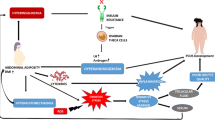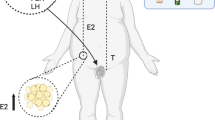Abstract
Introduction
PCOS is associated with mood/eating disorders. Negative body image due to obesity, acne, hirsutism seems to play significant role, but hormonal derangements are probably implicated.
Aim
To investigate the relation between insulin resistance (IR), obesity and hyperandrogenism with mood and eating disorders in women with PCOS.
Methods
Forty-nine (60.5%) PCOS women and 32(39.5%) age- and BMI-matched healthy controls were enrolled. Emotional/food disorders were evaluated by using self-administered questionnaires: Eating Attitudes Test (EAT)-26, Beck Depression Inventory-II (BDI-II), Hamilton anxiety scale (HAS) and Food Craving Questionnaire-Trait (FCQ-T).
Results
The two groups had no significant differences regarding age, BMI and HOMA2-IR. PCOS women had significantly higher DHEA-S (p < 0.0001), Δ4Α (p < 0.0001) and Testosterone (p < 0.0001). When the two groups were subclassified according to the BMI, in lean (BMI < 25 kg/m2) or overweight (BMI ≥ 25 kg/m2), no significant differences were found with respect to EAT-26 and HAS. BDI-II was associated with obesity (overweight vs lean PCOS: 20.5 ± 6.4 vs 9.8 ± 3.9; p = 0.037) and hyperandrogenism (overweight PCOS vs overweight controls: 20.5 ± 6.4 vs 14.8 ± 8.1; p < 0.0001; lean PCOS vs overweight controls: 16.7 ± 4.7 vs 14.8 ± 8.1; p = 0.01). Additionally, a significant correlation between BDI-II and DHEA-S (rho = 0.305; p = 0.006), Δ4Α (rho = 0.259; p = 0.02) and Testosterone (rho = 0.328; p = 0.003) was reported. FCQ-T was associated with obesity (overweight PCOS vs lean PCOS: 47.6 ± 9.9 vs 29.3 ± 8.9; p < 0.0001; overweight controls vs lean PCOS: 45.5 ± 15.7 vs 29.3 ± 8.9; p < 0.0001), whereas a correlation between FCQ-T and BMI (rho = 0.593; p = 0.0001), waist circumference (rho = 0.554; p = 0.0001) and HOMA2-IR (rho = 0.328; p = 0.003) was documented.
Conclusions
Obesity and hyperandrogenism increase the risk of depression and food cravings in women with PCOS, leading to a vicious circle of further aggravation of obesity and metabolic syndrome.


Similar content being viewed by others
Abbreviations
- PCOS:
-
Polycystic ovary syndrome
- IR:
-
Insulin Resistance
- BMI:
-
Body Mass Index
- WC:
-
Waist Circumference
- HOMA2-IR:
-
Homeostatic Model Assessment 2-Insulin Resistance
- Δ4Α:
-
Δ4-Androstenedione
- DHEA-S:
-
Dehydroepiandrosterone Sulfate
- SHBG:
-
Sex Hormone Binding Globulin
- EAT-26:
-
Eating Attitudes Test-26
- FCQ-T:
-
Food Craving Questionnaire-Trait
- HAS:
-
Ηamilton Anxiety Scale (HAS)
- BDI-II:
-
Beck Depression Inventory-II.
References
R. Azziz, PCOS in 2015: new insights into the genetics of polycystic ovary syndrome. Nat. Rev. Endocrinol. 12, 74–75 (2016)
A.H. Balen, L.C. Morley, M. Misso et al. The management of anovulatory infertility in women with polycystic ovary syndrome: an analysis of the evidence to support the development of global who guidance. Hum. Reprod. Update 22, 687–708 (2016)
H. Teede, A. Deeks, L. Moran, Polycystic ovary syndrome: a complex condition with psychological, reproductive and metabolic manifestations that impacts on health across the lifespan. BMC Med. 8, 41 (2010)
ESHRE/ASRM, Rotterdam sponsored PCOS consensus workshop group revised 2003 consensus on diagnostic criteria and long-term health risks related to polycystic ovary syndrome. Fertil. Steril. 81, 19–25 (2004)
S.L. Blay, J.V. Aguiar, I.C. Passos, Polycystic ovary syndrome and mental disorders: a systematic review and exploratory meta-analysis. Neuropsychiatr. Dis. Treat. 12, 2895–2903 (2016)
D.A. Dumesic, R.D. Schramm, D.H. Abbott, Early origins of polycystic ovary syndrome. Reprod. Fertil. Dev. 17, 349–360 (2005)
A. Dunaif, Polycystic ovary syndrome in 2011: genes, aging and sleep apnea in polycystic ovary syndrome. Nat. Rev. Endocrinol. 8, 72–74 (2011)
S.S. Lim, R.J. Norman, P.M. Clifton et al. Hyperandrogenemia, psychological distress, and food cravings in young women. Physiol. Behav. 98, 276–280 (2009)
A.L. Hirschberg, S. Naessen, M. Stridsberg et al. Impaired cholecystokinin secretion and disturbed appetite regulation in women with polycystic ovary syndrome. Gynecol. Endocrinol. 19, 79–87 (2004)
L.J. Moran, M. Noakes, P.M. Clifton et al. Ghrelin and measures of satiety are altered in polycystic ovary syndrome but not differentially affected by diet composition. J. Clin. Endocrinol. Metab. 89, 3337–3344 (2004)
C. Sundblad, L. Bergman, E. Eriksson, High levels of free testosterone in women with bulimia nervosa. Acta. Psychiatr. Scand. 90, 397–398 (1994)
S. Naessen, K. Carlstrom, B. Bystrom et al. Effects of an antiandrogenic oral contraceptive on appetite and eating behavior in bulimic women. Psychoneuroendocrinology 32, 548–554 (2007)
J. Hennegan, D.J. Brooks, K.J. Schwab et al. Measurement in the study of menstrual health and hygiene: a systematic review and audit. PLoS One 15, e0232935 (2020)
B.O. Yildiz, Diagnosis of hyperandrogenism: clinical criteria. Best Pract. Res. Clin. Endocrinol. Metab. 20, 167–176 (2006)
A.A. Deeks, M.E. Gibson-Helm, E. Paul et al. Is having polycystic ovary syndrome a predictor of poor psychological function including anxiety and depression? Hum. Reprod. 26, 1399–1407 (2011)
M.G. Saklayen, The global epidemic of the metabolic syndrome. Curr. Hypertens. Rep. 20, 12 (2018)
N.M. Papini, M. Jung, A. Cook et al. Psychometric properties of the 26-item eating attitudes test (EAT-26): an application of rasch analysis. J. Eat. Disord. 10, 62 (2022)
A. Meule, T. Hermann, A. Kubler, A short version of the food cravings questionnaire-trait: the FCQ-T-reduced. Front. Psychol. 5, 190 (2014)
E. Thompson, Hamilton rating scale for anxiety (HAM-A). Occup. Med. 65, 601 (2015)
Y.P. Wang, C. Gorenstein, Psychometric properties of the Beck Depression Inventory-II: a comprehensive review. Braz. J. Psychiatry 35, 416–431 (2013)
M. Giannakou, P. Roussi, M.E. Kosmides et al. Adaptation of the beck depression inventory-II to Greek population. Hell. J. Psychol. 10, 120–146 (2013)
K. Koutoulogenis, F. Gonidakis, M. Yannakoulia et al. Validation study of the food craving questionnaire-trait: reduced in Greek population. Psychiatrike 31, 118–128 (2020)
K.N. Fountoulakis, A. Iacovides, S. Kleanthous et al. The Greek translation of the symptoms rating scale for depression and anxiety: preliminary results of the validation study. BMC Psychiatry 3, 21 (2004)
D.L. Rofey, E.M. Szigethy, R.B. Noll, Cognitive–behavioral therapy for physical and emotional disturbances in adolescents with polycystic ovary syndrome: a pilot study. J. Pediatr. Psychol. 34, 156–163 (2009)
D.M. Garner, P.E. Garfnkel, The eating attitudes test: an index of the symptoms of anorexia nervosa. Psychol. Med. 9, 273–279 (1979)
V. Costarelli, K. Antonopoulou, C. Mavrovounioti, Psychosocial characteristics in relation to disordered eating attitudes in Greek adolescents. Eur. Eat. Disord. Rev. 19, 322–330 (2011)
A.O. Musaiger, F.I. Al-Kandari, M. Al-Mannai et al. Disordered eating attitudes among university students in Kuwait: the role of gender and obesity. Int. J. Prevent. Med. 7, 67 (2016)
T. Rivas, R. Bersabé, M. Jiménez et al. The eating attitudes test (EAT26): reliability and validity in Spanish female samples. Span. J. Psychol. 13, 1044–1056 (2010)
L.M. Schaefer, L.M. Anderson, M. Simone et al. Gender-based differential item functioning in measures of eating pathology. Int. J. Eat. Disord. 52, 1047–1051 (2019)
K. Lambourne, R.A. Washburn, C. Gibson et al. Weight management by phone conference call: a comparison with a traditional face-to-face clinic. Rationale and design for a randomized equivalence trial. Contemp. Clin. Trials 33, 1044–1055 (2012)
B. Orbitello, R. Ciano, M. Corsaro et al. The EAT-26 as screening instrument for clinical nutrition unit attenders. Int. J. Obes. 30, 977–981 (2006)
G. Osei-Assibey, I. Kyrou, S. Kumar et al. Self-reported psychosocial health in obese patients before and after weight loss. J. Obes. 29, 2010 (2010)
T. Rodríguez-Cano, L. Beato-Fernández, A. Belmonte-Llario, New contributions to the prevalence of eating disorders in Spanish adolescents: detection of false negatives. Eur. Psychiatry 20, 173–178 (2005)
M.A. Sulaiman, Y.M. Al-Farsi, M.M. Al-Khaduri et al. Psychological burden among women with polycystic ovarian syndrome in Oman: a case-control study. Int. J. Women Health 9, 897–904 (2017)
R. Watrowski, A. Rohde, M. Maciejewska-Jeske, Hormonal and psychosocial correlates of psychological well-being and negative affectivity in young gynecological-endocrinological patients. Gynecol. Endocrinol. 32, 21–24 (2016)
L.G. Cooney, I. Lee, M.D. Sammel et al. High prevalence of moderate and severe depressive and anxiety symptoms in polycystic ovary syndrome: a systematic review and meta-analysis. Hum. Reprod. 32, 1075–1091 (2017)
E.A. Greenwood, L.A. Pasch, M.I. Cedars et al. Insulin resistance is associated with depression risk in polycystic ovary syndrome. Fertil. Steril. 110, 27–34 (2018)
N. Cinar, M.C. Kizilarslanoglu, A. Harmanci et al. Depression, anxiety and cardiometabolic risk in polycystic ovary syndrome. Hum. Reprod. 26, 3339–3345 (2011)
A. Dokras, D.B. Sarwer, K.C. Allison et al. Weight loss and lowering androgens predict improvements in health-related quality of life in women with PCOS. J. Clin. Endocrinol. Metab. 101, 2966–2974 (2016)
N.A. Huijgen, Y.V. Louwers, S.P. Willemsen et al. Dietary patterns and the phenotype of polycystic ovary syndrome: the chance of ongoing pregnancy. Reprod. Biomed. 34, 668–676 (2017)
K. El-Haschimi, D.D. Pierroz, S.M. Hileman et al. Two defects contribute to hypothalamic leptin resistance in mice with diet-induced obesity. J. Clin. Investig. 105, 1827–1832 (2000)
Author information
Authors and Affiliations
Corresponding author
Ethics declarations
Conflict of interest
The authors declare no competing interests.
Consent to publish
All authors contributed to the interpretation of the data and reviewed and approved the manuscript.
Ethical approval
The study was performed according to the principles of the declaration of Helsinki as revised in 1983 and approval was obtained by the Ethics Committee of Alexandra General Hospital of Athens, Greece.
Informed consent
Informed consent was obtained from all individual participants included in the study.
Additional information
Publisher’s note Springer Nature remains neutral with regard to jurisdictional claims in published maps and institutional affiliations.
Rights and permissions
Springer Nature or its licensor (e.g. a society or other partner) holds exclusive rights to this article under a publishing agreement with the author(s) or other rightsholder(s); author self-archiving of the accepted manuscript version of this article is solely governed by the terms of such publishing agreement and applicable law.
About this article
Cite this article
Stefanaki, K., Karagiannakis, D.S., Raftopoulou, M. et al. Obesity and hyperandrogenism are implicated with anxiety, depression and food cravings in women with polycystic ovary syndrome. Endocrine 82, 201–208 (2023). https://doi.org/10.1007/s12020-023-03436-1
Received:
Accepted:
Published:
Issue Date:
DOI: https://doi.org/10.1007/s12020-023-03436-1




